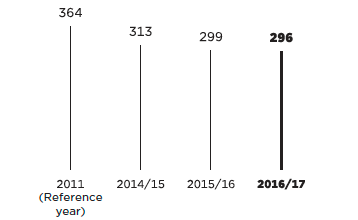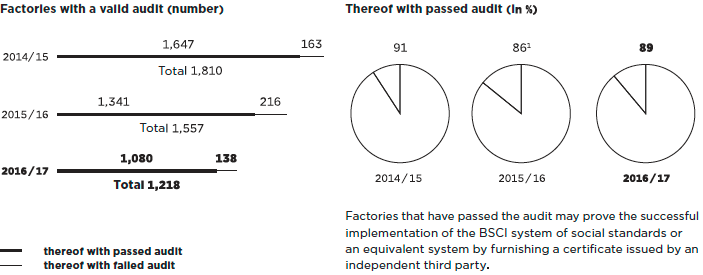Sustainability
In 2015, the United Nations declared the global community’s Sustainable Development Goals (SDGs). A detailed global agenda was provided to assist governments, companies and private individuals in reaching the overall 17 goals required to achieve a sustainable development on an economic, social and environmental level. Also METRO considers itself an active member of the global community and strives to contribute to the creation of additional value and thereby the attainment of the SDGs. As companies, we have a moral obligation to balance our economic interests with both social demands as well as the demands of our customers, employees, investors and business partners and to not limit our efforts to the requirements imposed on us by the legislator. We must respect the limits placed on us by humanity and the natural environment. For us, sustainability does not stop at focusing on environmental and social issues. The notion of sustainability encompasses every single aspect of our actions and is a fixed item on the agenda of our corporate strategy.
Our stakeholders use ratings to evaluate the sustainability measures carried out by METRO. These evaluations provide important motivation to us and serve as a management tool because they demonstrate the progress of and potential to improve our activities.
Oekom Corporate Rating awarded METRO in September 2017 the prime status C+ (on a scale from D- to A+). Financial year 2016/17 also saw the internationally renowned sustainability indexes Dow Jones Sustainability World and Europe ranking our group as the leading company in its sector for the third consecutive time.
When it comes to defining our responsibilities and key focus areas, we do not just rely on our own internal perspective.
The former METRO GROUP conducted an initial stakeholder survey in 2016. The results of this survey continue to bear relevance for METRO today. The survey assists us in reviewing the relevance of the identified issues and also plays a role in the simplified materiality analysis for financial year 2016/17.
Commitment to our employees
In terms of our sustainable corporate governance, we consider it our duty to create and ensure an attractive, fair and safe work environment. We take the approach of valuing the individuality of our employees, encouraging their diversity and strengthening their personal responsibility. This allows us to support them in implementing our strategy successfully and sustainably.
Sustainable business operations
A responsible consumption of energy and other natural resources is crucial for all of us. The use of resources has a direct effect on our operating costs and may entail undesirable environmental implications, such as the emission of climate-damaging greenhouse gases. We strive to reduce the climate-relevant emissions caused by our business operations and our consumption of natural resources. We do this by focusing on intelligent energy consumption and investments aimed at increasing our energy efficiency. Adopting targeted measures enables us to reduce consumption levels as well as costs. We are also committed to responsible resource management.
Climate protection target status
Greenhouse gas emissions in kg CO2 (CO2-equivalent)
per m2 sales floor

Further key focal issues in relation to sustainable business operations are the prevention of waste, the reuse of resources and their recovery by means of recycling. The reduction of food waste is an issue of particular importance for the operational business of METRO.
Sustainable procurement and assortment management
In our procurement activities, we strive to purchase high-quality and safe products that are socially acceptable and environmentally safe. This provides the foundation for a sustainability-focused management of our assortment. As a retailer, our business also depends on the long-term availability of resources, as these raw materials are needed to produce and package our products. Therefore, our actions are consistently geared to implement our group-wide purchasing policy for sustainable procurement across our entire product range. This policy sets out the fundamental requirements for sustainable supply chain and procurement management.
We aim to ensure socially acceptable working conditions within our sourcing channels. A systematic approach to achieving social standards is an integral part of the process.
Social audits relating to own imports by METRO SOURCING and non-food own brand products of the METRO sales lines
as of the closing date of 30/9

1 Adjustment of the BSCI rating system from three rating levels (good / improvment needed / non-compliant) in 2015 to five levels (A/B/C/D/E). The result “improvements needed” has been counted as a “passed” result. Some of the results previously counted as “improvements needed” have been reassigned to either “C” (passed) or “D” (failed) under the new rating system. The adjustment resulted in a declining proportion of producers in financial year 2015/16 that passed the audit.
Sustainable consumption
The specific product mixes of our sales lines are tailor-made to perfectly match the diverse needs of our private and commercial customers. These products and services must not only meet quality and safety requirements. Increasingly, they must also satisfy critical social and environmental requirements – from production and procurement to usage and disposal. For this reason, we focus firmly on measures that enable us to shape the relevant product features on the basis of our guidelines for sustainable purchasing. Our goal is to procure products that satisfy environmental, social and economic considerations.
In financial year 2016/17, METRO Cash & Carry and Real generated sales of nearly €16 million in Germany from fair trade products.
This figure includes all articles bearing a Fairtrade or GEPA label. In the same period, our sales lines generated nearly €140 million in Germany-wide sales of products certified in accordance with the EU regulation on organic products. Our assortment also includes products from sustainable fisheries and aquaculture. In financial year 2016/17, METRO Cash & Carry and Real generated sales of more than €93 million from their sustainable fish assortment in Germany.
The Real sales line generated sales of more than €440 million from regional products during the past financial year. The sales lines increasingly offer its customers products from sustainable forestry. Sales of products bearing either the Forest Stewardship Council (FSC®) or the Programme for the Endorsement of Forest Certification (PEFC) label exceeded €39 million in Germany.
Consumption, even at reasonable levels, always involves the use and depletion of resources. We therefore feel that it is our responsibility to minimise the resultant waste and emissions.
Social commitment
METRO views its commitment to society and the environment as a form of creating additional value by addressing the challenges faced by our society. Our diverse activities aim at promoting the intercultural dialogue, supporting our retail and wholesale outlets and their local communities and offering targeted help to people in need.
- For more information, see the Annual Report 2016/17 at www.metroag.de/more/sustainability.